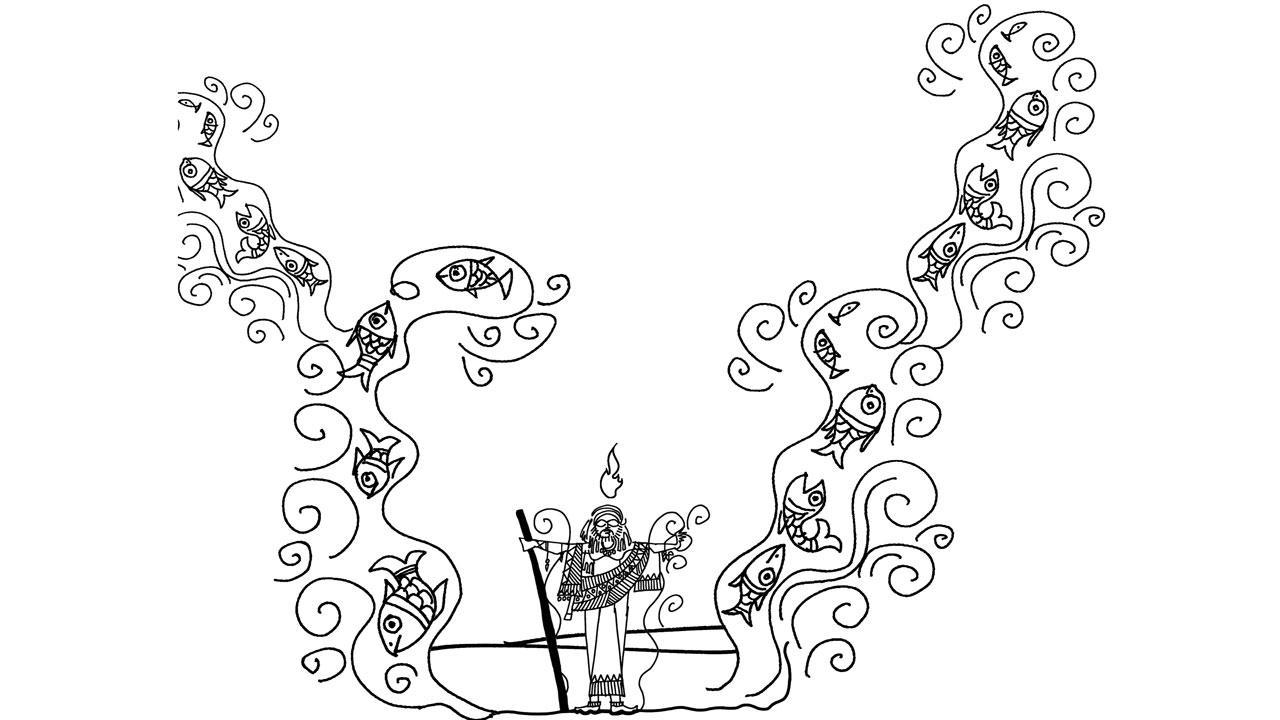Joseph is a character from the Old Testament or the Jewish Bible, who helped the Egyptian pharaoh to collect grain during years of harvest, which could be used during years of famine

Illustration/Devdutt Pattanaik
 In medieval India, when people saw the Ashoka Pillar, they did not know it was Ashoka’s pillar. They identified it as Bhima’s staff or Bhim-ki-lathi. In other words, a historical object became a mythological object. Quite in the same way, pyramids of Egypt, tombs for pharaohs built 4,500 years ago, were identified as the mythological granaries of Joseph by Christian pilgrims a thousand years ago.
In medieval India, when people saw the Ashoka Pillar, they did not know it was Ashoka’s pillar. They identified it as Bhima’s staff or Bhim-ki-lathi. In other words, a historical object became a mythological object. Quite in the same way, pyramids of Egypt, tombs for pharaohs built 4,500 years ago, were identified as the mythological granaries of Joseph by Christian pilgrims a thousand years ago.
Joseph is a character from the Old Testament or the Jewish Bible, who helped the Egyptian pharaoh to collect grain during years of harvest, which could be used during years of famine. This feat earned him a respected place in Egyptian society, and enabled his Hebrew relatives to migrate to Egypt, where they were unfortunately enslaved a few generations later.
Human beings across the world are the same, and we react to sacred narratives in the same way. The scientific way of thinking enables us to decode these mythological stories and find out the metaphors expressed through them, what they could possibly represent or mean. However, the faithful reject the scientific analysis and prefer belief systems, or ideas that reinforce their beliefs.
Many orthodox Jewish people believe that the Holy Land of Israel was given to them by God following the Exodus out of Egypt to escape slavery. Some even argue that it happened around 1500 BCE, after the arrival of horses in Egypt. However, when historians studied the thousands of hieroglyphics found across Egypt, they have found not a single mention of slavery of the Hebrew people, or their exodus! Believers, however, insist that there is a global conspiracy to cover up the actual biblical events. Same way as many Hindus believe there is a global conspiracy to deny ancient Hindu greatness.
The same thing is seen in Islam. Videos on social media made by the Americans Christians about Islam go out of their way to show how the Prophet Muhammad’s biography, the Hadith, as well as his conversation of God, the Quran, are not genuine scriptures, but documents produced several generations later, based on ancient Christian and Persian lore. The very same people who use critical thinking to debunk Islamic claims, do not apply the same principles to the Christian documents and insist that the death and resurrection of Jesus Christ was a true historical event.
In India, historians have discovered that Adi Shankaracharya lived in the seventh century, based on biographies that were produced several centuries years later, after the 13th century. However, if you talk to the faithful, especially the Advaita monastic orders, they will say that he established the Mathas in the four corners of India 2,500 years ago. Likewise, in the Christian world, it is believed that the Pope of the Catholic Church has an unbroken line of succession, right from St Peter who was given the sacred word by Jesus himself. These unproven, and unprovable, histories grant legitimacy to those who want to be religious spokespersons.
Across the world we find similar ways of approaching their holy scriptures. Believers always prefer matters of faith and get irritated with matters of science. Indians are certainly not more myth oriented than the peoples of Europe and America.
The author writes and lectures on the relevance of mythology in modern times. Reach him at devdutt.pattanaik@mid-day.com
 Subscribe today by clicking the link and stay updated with the latest news!" Click here!
Subscribe today by clicking the link and stay updated with the latest news!" Click here!








